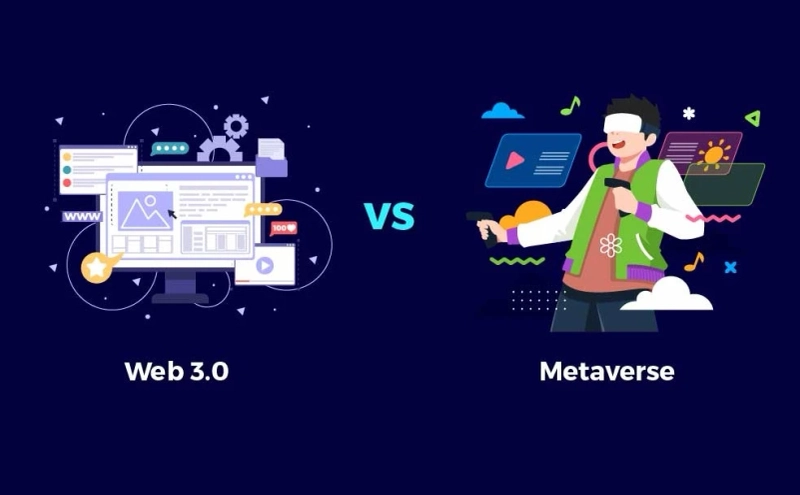Currently, the accelerated advancement of technologies has led us to the creation of innovative and revolutionary concepts such as the metaverse and Web3. However, there is often confusion between these two terms, leading to misunderstandings and an incorrect focus on their applications and potential, reflected in ridiculous, biased or simply misinformed headlines. In this article I will briefly discuss the concepts of the metaverse and Web3, examine two seemingly contradictory perspectives that often lead to confusion, and address the role of artificial intelligence and large-scale language models in this context that can contribute to their development in the future.
Metaverse vs. Web3: Definitions and differences
The metaverse is a term commonly used to describe an immersive, three-dimensional virtual space where users can interact through digital avatars. This concept encompasses the idea of multiple interconnected and interoperable virtual worlds, allowing users to move from one to another seamlessly, something that thousands of companies from all sectors around the world are already working on under the auspices of organizations such as the Metaverse. Standards Forum or the Open Metaverse Foundation, to name just two.
On the other hand, Web3 is a term that refers to an evolution of the current web, driven by blockchain technology and cryptocurrencies. Web3 seeks to decentralize and democratize access to and control of online resources, allowing the creation of applications and blockchain development services that do not depend on centralized intermediaries and giving rise to new applications.
Two often misunderstood and confused concepts
The terms "metaverse" and "Web3" have gained noticeable popularity in the world of technology in the past couple of years and are often used interchangeably, leading to some confusion about what each of these concepts represents and how to describe it. They relate to each other.
Who do not want to cede their decentralized management to the blockchain world? Therefore, talking about the metaverse without mentioning Web3 is inaccurate.
For many, the creation of 3D virtual worlds and real-time interaction of users requires decentralized and autonomous technology that guarantees the security, privacy and interoperability of interactions, and cryptocurrencies and NFTs can facilitate the economy and the exchange of goods and services within the metaverse.
But identifying "metaverse" with "Web3" in a headline or lead in any current news that we can read today on the internet usually automatically reveals that the content of the text will refer to cryptocurrencies, NFTs and their huge global exchange market in different exchanges.
It is likely that the confusion between the two concepts is due to the fact that we are still in an early stage of development of these technologies and their implications are not fully understood. As these technologies evolve and are applied in the real world, it is likely that there will be more clarity about their relationship and their role in the future of technology.
The role of artificial intelligence in the development of both spheres
It is expected that artificial intelligence and large language models (LLM) will have a fundamental role in the development of the metaverse and Web3 in the future. Artificial intelligence (AI) has become a key component of many emerging technologies, and its role in the development of the metaverse and Web3 is no exception.
AI could have a significant impact on the development of the metaverse and Web3 in several areas. One of the most obvious is the improvement of the interaction between humans and computers in these virtual environments. AI can help create more intuitive and natural user interfaces, allowing users to more efficiently and effectively interact with virtual worlds and the Web3.
Furthermore, AI could also help in the creation of content in the metaverse and Web3. Creating content in these virtual environments is a very resource and time intensive process, and AI could help automate much of this process. For example, AI could assist in the generation of landscapes and environments, allowing content creators to focus on creating more complex characters and plots. Or help manage countless blockchain development company smart contract management use cases.
Another area where AI could have an impact is the security and privacy of users in the metaverse and Web3.. AI can be used to detect and prevent fraudulent and malicious activities, as well as to ensure the privacy of online users. Several prestigious analysts and businessmen have raised the alarm about the increasingly real danger of malicious actors using AI applications to impersonate other people in a way that has never been known before, including their voice and appearance: imagine receiving a video call from a relative in an unknown environment begging for your help (and your money) claiming to have been the object of an express kidnapping. Only other artificial intelligence tools could help identify the fake and unmask it. Not to mention the storm of scams that is coming with phishing techniques with fake profiling. The AI, in turn, can combat them with the identification of patterns, the development of fraud detection algorithms, and also with the training and warning of its users. The metaverse and Web3 can become a lot like a new Wild West, and we will have to help ourselves with AI to enforce the law.
Finally, AI could also help create new applications, services, and experiences in the metaverse and Web3. AI can help identify new business opportunities and design innovative solutions to solve existing problems.
AI has a key role to play in the future of the metaverse and Web3. Its ability to enhance human interaction, automate content creation, improve user security and privacy, and foster innovation could help fuel the development of these two emerging spheres in the coming years, two complementary fields that are needed. Mutually to achieve a more autonomous Internet rich in experiences. As these technologies evolve, it is likely that there will be a greater understanding of their relationship and their role in the future of virtual society.


